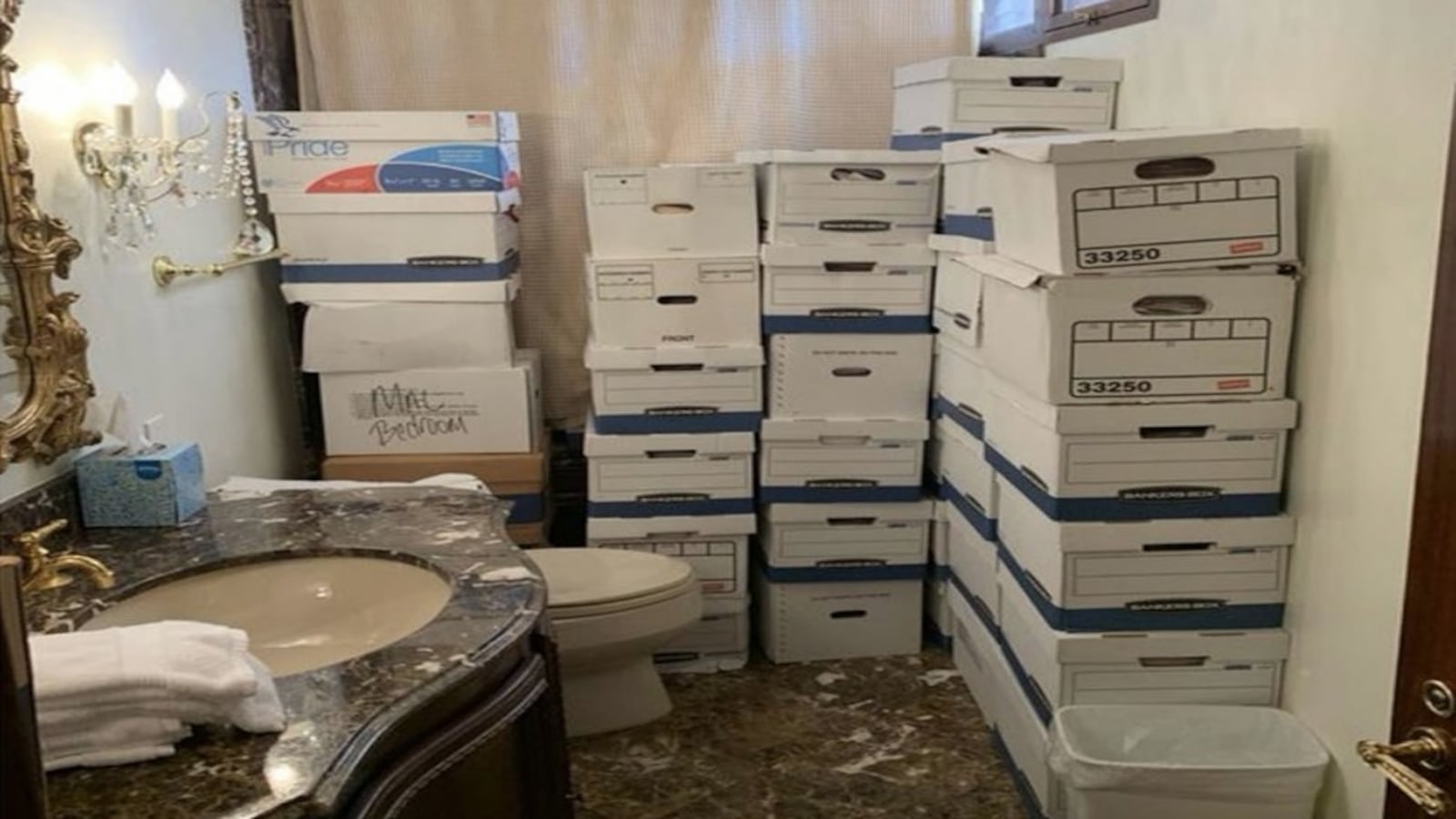Former President Donald Trump’s federal indictment is a scathing, 44-page read that opens with the assertion that, in his post-presidency, Trump flagrantly violated the very national security laws that he used to propel himself to the White House in 2016.
Trump faces up to 20 years in prison for allegedly putting the nation’s safety at risk by keeping hundreds of classified records, spilling secrets to boast of his immense power as a former commander-in-chief, and orchestrating a campaign to block the feds from getting them back.
The 37-count indictment against Trump marks the very first time a former American president faces charges for seven different federal crimes. Trump has been formally accused of willful retention of national defense information, engaging in a conspiracy to obstruct justice, withholding a government record, concealing an official document, hiding a record from a federal investigation, scheming to conceal, and making false statements.
The indictment also details how Walt Nauta, a U.S. Navy veteran who became the former president’s trusted Diet Coke valet, played a key role in an attempted coverup. He was hit with similar criminal charges as a co-conspirator.
The documents that Trump held in his possession included highly classified, sensitive materials—many of them related to military and nuclear secrets of the United States and foreign countries. A number of the documents were classified as “top secret.”
Still, Trump was quick to claim on Truth Social on Friday that nobody said he wasn’t allowed to look at “the personal records” he brought to Mar-a-Lago from the White House.
“There’s nothing wrong with that,” he said.
The nation's laws are clear that there is something wrong with that, however. And the indictment shows that Trump was repeatedly informed—and aware—that he improperly possessed classified documents that were not his.
The 44-page indictment details a number of damning instances when Trump knowingly shared classified information and conspired to retain the classified documents—337 pages of them—even after the National Archives sought their return.
The DOJ cites a July 2021 media interview with Trump at his New Jersey club Trump National Golf Club Bedminster. None of the participants in the media interview—including Trump and one of his staffers—had an active security clearance. But Trump still shared a “plan of attack” that the Pentagon and a senior military official had prepared for him.
“TRUMP told the individuals that the plan was ‘highly confidential’ and ‘secret,’” the indictment notes. “TRUMP also said, ‘as president I could have declassified it,’ and, ‘Now I can't, you know, but this is still a secret.’”

Boxes of documents found in a ballroom at Mar-a-Lago.
U.S. District CourtThe indictment also alleges that, on May 23, 2022, Trump met with two of his attorneys at Mar-a-Lago and discussed how they wanted to comply with a subpoena seeking the return of classified documents.
One of Trump’s attorneys claimed that Trump said something to the effect of “I don't want anybody looking through my boxes,” and asked what would happen “if we just don't respond at all or don't play ball with them.”
“Wouldn't it be better if we just told them we don't have anything here?” Trump asked, according to the lawyer.
Contrary to Trump’s insistence that he had nothing to do with packing up his own boxes when vacating the White House in January 2021, the indictment alleges he was “personally involved in the process.”
Among a number of disclosures in the indictment, the DOJ also revealed that Trump at one point stored classified documents in a shower, in addition to places like a ballroom stage that Mar-a-Lago members regularly had access to and a business center at his Florida estate.
The indictment is also revealing of how some of Trump’s closest aides spoke about him behind his back.

In one exchange, Trump employees discuss whether they can move some of Trump’s boxes of documents out of a Mar-a-Lago business center so that staff could use the space as an office.
“Woah!! Ok so potus specifically asked Walt for those boxes to be in the business center because they are his ‘papers,’” one Trump employee texted to another, referencing Walt Nauta.
The two employees then go back and forth discussing what they could move to storage.
“There is still a little room in the shower where his other stuff is,” one employee texted. “Is it only his papers he cares about? Theres some other stuff in there that are not papers. Could that go to storage? Or does he want everything in there on property.”
“Yes,” the second employee responds. “Anything that's not the beautiful mind paper boxes can definitely go to storage.”
Meanwhile, the indictment recounts how Trump professed to being “an open book” while discussing the matter with federal investigators.
And as a twist of the knife, the DOJ documents a number of instances when Trump discussed the importance of enforcing classified information laws.
“In my administration I'm going to enforce all laws concerning the protection of classified information. No one will be above the law,” Trump said on Aug. 18, 2016.
“We can't have someone in the Oval Office who doesn't understand the meaning of the word confidential or classified,” Trump said on Sept. 6, 2016.
The very next day, he said one of the first things “we must do is to enforce all classification rules and to enforce all laws relating to the handling of classified information."
"We also need the best protection of classified information,” Trump said Sept. 19, 2016.
The indictment also confirmed that the case has been assigned to U.S. District Judge Aileen Cannon, the very same Trump-appointed federal judge who previously tried to derail the investigation at its early stages by issuing controversial rulings that stopped FBI special agents from initially reviewing seized materials. It’s a startling turn that could present legal challenges for prosecutors, who now face a loyal judge who has already shown herself willing to lean far to one side to appease Trump.
Trump is set to be arraigned in South Florida federal court on Tuesday, the day before his 77th birthday.
On his Truth Social media network Friday afternoon, Trump took personal shots at Special Counsel Jack Smith, calling Smith “deranged.”
“His wife is a Trump Hater, just as he is a Trump Hater—a deranged ‘psycho’ that shouldn’t be involved in any case having to do with ‘Justice,’” Trump posted minutes before Smith held a Friday press conference in Washington, D.C.
At 3 p.m., Smith delivered a brief statement where he asserted that “We have one set of laws in this country, and they apply to everyone.” Without mentioning Trump by name, Smith stressed that the defendants in the case "must be presumed innocent until proven guilty beyond a reasonable doubt in a court of law.”
But he hinted at the importance of resolving this case as quickly as possible, before the next election, saying his team would pursue a “speedy trial” in South Florida.
Smith called for the nation to closely read the indictment itself, noting that “violations of those laws put our country at risk.”








